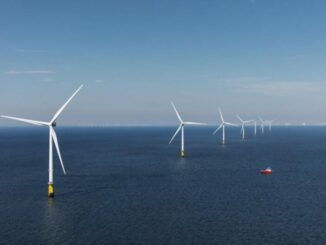
- The UK’s 2019 Net Zero law, once universally praised, is now blamed for high energy costs, industrial closures, and grid inefficiencies.
- Conservatives have vowed to scrap the 2050 target, while even Labour faces union pressure to roll back on ambitious climate commitments.
- Britain’s energy crisis highlights a paradox: subsidising idle wind farms, losing industry to the U.S., and underusing North Sea resources while energy demand surges.
Once upon a time the promise of Net Zero enjoyed such universal support that a Tory government signed the UK’s Net Zero pledge into law. Today, the Tories say they’d scrap it – while alarm bells are ringing as the costs of the policy become clearer.
In June 2019, Prime Minister Theresa May passed a law – with near unanimous parliamentary backing and pretty much no debate – committing the UK to achieve Net Zero by 2050.
She hailed the move as a “historic step” that would make the UK the first major economy in the world to set such a legally binding target.
“Now is the time to go further and faster,” she said – “for our children” – and it was framed as a moral issue, a moment to be on the right side of history.
And while everyone was patting themselves on the back, and as the lofty ambition was turned into legal text, the UK accelerated down a path that is only now being fully understood.
If Theresa May hadn’t signed the 2050 into law someone else would have, such was the consensus and such was the sense of inevitability whipped up in those heady pre-Covid, pre-War days.
And where has it taken us?
The UK has the highest cost of energy in the developed world – for households and businesses – and we’ve been putting wind farms faster than our energy infrastructure can handle them – leading to a situation where we – taxpayers, bill payers – will pay £1bn this year to wind farm operators to turn off those wind farms when it’s too windy.
We’ve put the cart before the horse
Vast sums are then spent on replacement gas power to keep the lights on. And that’s almost certainly imported gas, by the way, as we’ve rather gone off producing our own.
It’s a problem known as ‘curtailment’ – too much wind produces too much power and it would overwhelm the congested network and so they’re simply switched off.
The National Energy System Operator, which runs the grid, says the cost of this – the constraint cost – could surge to £8bn a year by 2030.
We’ve put the cart before the horse. Windfarms were the great visible manifestation of our Net Zero drive – but we haven’t built the pylons and cables to make them worthwhile – something that will take years and cost billions.
There’s no problem with ultimately attaining a state of Net Zero emissions; the problems lie in the law, the target date and the consequences of an ill-thought through rush.
High energy costs are forcing chemical, cement and manufacturing plants to close. Energy investment and associated manufacturing are heading for the US. The North Sea is viewed as an awkward relic rather than a natural asset and the combination of green levies, subsidies and taxes are making a mess of the entire system.
Conservatives repent
Today the Conservatives, the moral and political architects of the 2050 target, say they’d scrap their law. They’ve seen the light. The Institute of Economic Affairs says the Tories’ announcement is “the first step back to sanity” – pointing out that the Climate Change Act was “the biggest central planning mistake since the Soviet Union’s Five Year Economic Plans.”
Kemi Badenoch says “Climate change is real. But Labour’s laws tied us in red tape, loaded us with costs, and did nothing to cut global emissions. Previous Conservative governments tried to make Labour’s climate laws work – they don’t.”
She said that the Conservatives would make the North Sea the “cornerstone” of UK energy policy by ending a ban on new oil and gas exploration, and that as Prime Minister her priorities would be “growth, cheaper energy” and a renewed commitment to protecting the environment.
Even Labour, whose climate change secretary Ed Miliband is a full blown High Priest of Net Zero zealotry, is considering rowing back from some of its bolder commitments. That would certainly please the unions, who have been shouting at the deindustrialisation unleashed by the Net Zero sprint.
Miliband policies “a disaster”
Sharon Graham, boss of the Unite union, has called for Miliband to be sacked, labelling his Net Zero plan “a disaster” and accusing him of being “completely irresponsible” with the UK’s energy security and jobs in the oil and gas sector. And she’s right. Oil refineries are closing. Chemicals plants are closing. And the promised green jobs boom is felt more in consultancy and the civil service than in any factory.
Ahead of the Budget, the British Chambers of Commerce have called on the government to remove the windfall taxes imposed on oil and gas producers in the North Sea, saying the policy puts the UK at a “competitive disadvantage.”
Meanwhile, our energy demands are going to skyrocket – not least given all the hungry new data centres unveiled in recent weeks.
It seems when it comes to energy the best approach is to do everything, everywhere, but not all at once.
We need nuclear, and we’re getting more of it. We need the North Sea, but we’re ashamed of it. We need renewables – but only when the network can actually take the power and we shouldn’t be spending vast sums to subsidise biomass energy that burns wood from South America shipped to the UK and is somehow, supposedly, green. And we do need to look again at the law of the land – the feel-good commitment to be Net Zero by 2050.
The Tories and Reform have woken up to this. It seems many in Labour have, too, though it’s likely Ed Miliband will barricade himself in his office with hostages before recognising the political and economic reality that’s coming into focus.
Policies change. They evolve. They adapt to meet circumstances. They encounter problems and breakthroughs at unexpected moments. They do not always conform with political aspirations and timelines and badly-written law, and it seems that the penny is beginning to drop.
By CityAM






